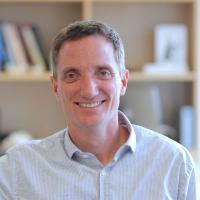Professor of Neuroscience; Codirector, Grossman Center for the Statistics of Mind and Principal Investigator at Columbia's Zuckerman Institute
I want to understand us, and there’s not going to be a single Einstein who figures it all out. It’s going to take a lot of us, working very hard for a long period of time, making steady progress.
With potential ramifications for people suffering from paralysis, missing limbs and Parkinson’s disease, Mark Churchland is studying how the brain plans, triggers and executes movement.
Read more about Mark M. Churchland, PhD >
If you are thirsty and reach for a glass of water, that is a voluntary movement. A knee-jerk reaction is not. What about grabbing a falling mug—is that voluntary? Philosophers have long debated what kind of actions we freely choose versus those that are reflexive. But now, with the help of new technologies, neuroscientists can look into the brain and try to distinguish between the two. Mark Churchland, PhD, studies movement and how the brain prepares to act — work that could one day help treat people with movement disorders.
Dr. Churchland, a principal investigator at Columbia’s Mortimer B. Zuckerman Mind Brain Behavior Institute, does this in part by training animals to play video games. In one task, a spot on a computer screen grows larger and they can touch it whenever they like, similar to reaching for a glass of water. In another, they touch the spot as soon as it appears, similar to catching a falling mug. Meanwhile, Dr. Churchland records electrical activity from their motor cortex, a region of the brain that guides movement.
Dr. Churchland has found that the same brain activity that appears as the animal takes its time to prepare also appears before the animal reacts to a surprise spot, just on a very compressed timescale. “So there is some unified mechanism by which we generate all of our voluntary movements,” Dr. Churchland says. This was in some ways unexpected, given the different types of volition.
Studying how the brain prepares for movement offers a peek at a computational process that is normally hidden from direct observation but that has immediate consequences, Dr. Churchland explains. “There’s just something intellectually satisfying about being able to study activity that’s both internal and abstract, yet is also tightly tied to behavior that as a scientist you can quantify and observe.”
In work done before he came to Columbia, Dr. Churchland found that the nerve cells, or neurons, that drive movement do not correspond in any simple way to muscle activity. Rather, an ensemble of cells, each firing with its own rhythm, comes together to control movement.
Dr. Churchland’s research may lend new insights into treatments for Parkinson’s disease, a condition marked by the inability to initiate action. It also could help improve neural prostheses — devices that translate neural activity into computer input that then controls the movement of a prosthetic limb—for people with paralysis. “In particular, you don’t want everything you prepare to do to be something you actually do,” Dr. Churchland says. So computers need to distinguish preparation from initiation — the get ready from the go.
Columbia has provided Dr. Churchland with a font of collaborators in computational neuroscience to help him interpret his data. “There’s really no way that we’re going to understand how the brain does anything interesting without coming up with good, formal mechanistic explanations couched in mathematics for what’s going on underneath the hood,” he remarks.
Churchland was drawn to neuroscience because of the challenge. “I want to understand us,” he says. “And there’s not going to be a single Einstein who figures it all out. It’s going to take a lot of us, working very hard for a long period of time, making steady progress. It seems like a noble thing to want to be part of that.”
Project Lead (2017-present)
Seely JS, Kaufman MT, Ryu SI, Shenoy KV, Cunningham JP,
PLoS Comput Biol.2016 Nov 4
Elsayed GF, Lara AH, Kaufman MT, , Cunningham JP
Nat Commun.2016 Oct 27
Kaufman MT, Seely JS, Sussillo D, Ryu SI, Shenoy KV,
eNeuro.2016 Aug 30
Kao JC, Nuyujukian P, Ryu SI, , Cunningham JP, Shenoy KV
Nat Commun.2015 Jul 29
Kiehn O,
Curr Opin Neurobiol.2015 Aug